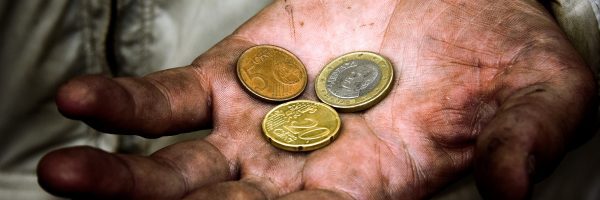Berkeley Charity Study Examines How We Often Dehumanize Those in Need

An often-seen angle of charity is that the recipient is down on their luck, destitute, and in need of outside assistance; but that imagery may play into a indirect dehumanization of those in need, and make things worse than before, writes Berkeley University Haas School of Business assistant professor Juliana Schroeder.
Schroeder, who’s research focuses on “judgment, decision-making, and interpersonal and intergroup processes,” criticizes the way in which charities like Sally Struthers’ Christian Children’s Fund portray its aid recipients as helpless victims may “unintentionally send a signal they have low mental capacity.”
“Charities want to motivate people to give more, but they may also make people think poor people don’t have the ability to take care of themselves. If you perceive of someone as having less mental capacity to think or feel, then you are subtly degrading and dehumanizing them,” she explains.
Schroeder, along with Northwestern’s Adam Waytz and University of Chicago’s Nicholas Epley, published a new study in the Journal of Experimental Psychology, which reveals “fundamental truths about how people think about giving and receiving aid.” The researchers found that not only do people act “more paternalistically towards those they believe have lower mental capacity,” but that they also “often believe they have more mental capacity than others.”
Schroeder explains, “When you think of a person having less self-control and willpower, you think they will make bad decisions and will be more likely to waste the aid. They don’t know what is good for themselves. People are pretty convinced they have a lot of willpower, while others don’t have the same level of self-control.”
The good news is that these perceptions are malleable. By questioning them, we can begin to “question how our perceptions of ourselves and others may affect the way we behave.”
Schroeder concludes, “When you dehumanize an individual or a group it can affect how you help them. People can be more cognizant about the ways they are thinking about their own mental capacity and that of others and pause to get more information before they start helping.”
Stanford GSB Research: Ambivalence Helps Us Take Risks

Stanford’s Graduate School of Business recently published an article by Eilene Zimmerman on a paper co-authored by social psychology professor Christian Wheeler and Yale’s Taly Reich that appeared this past April in the Journal of Personality and Social Psychology.
Continue reading…
Assistant Professor at Albers School Discusses Prejudice in Hiring

A new article published by Assistant Professor of Marketing, Mathew Isaac Ph.D., out of Seattle University’s Albers School of Business, provides insight into the hiring process. In the article, he recognizes the truth of unconscious prejudice in companies and offers guidance on how to avoid it. Continue reading…
Register for an Info Session About the UIC Liautaud MBA

For anyone wondering what it’s really like to be a UIC Liautaud Graduate School of Business MBA student, you can visit the school August, 29th from 9:30 to 11AM for an information session about the school’s MBA program. The session will be sponsored by the UIC College of Business Administration and will take place in Douglas Hall Room 170. Continue reading…
